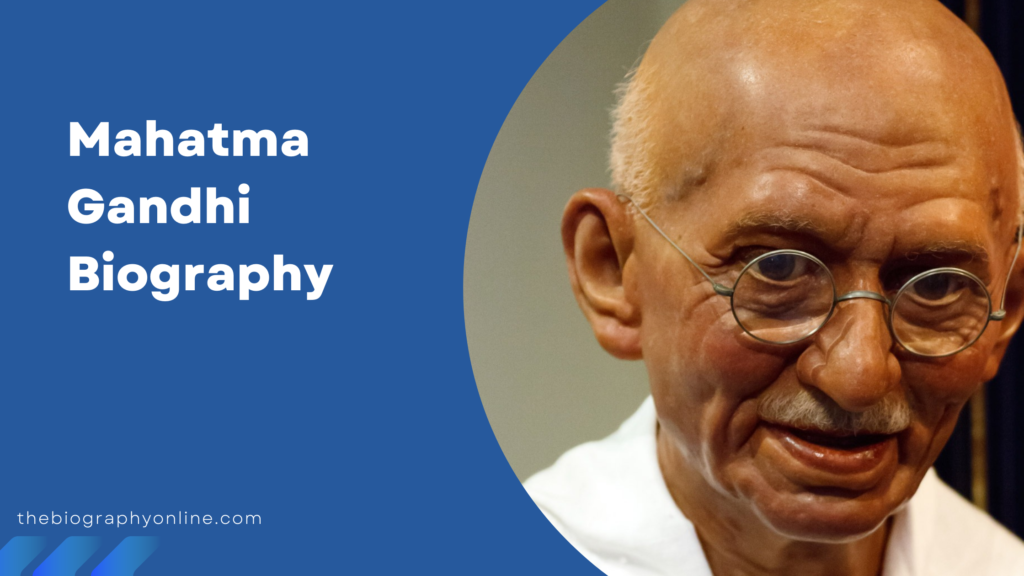Mahatma Gandhi, also known as Mohandas Karamchand Gandhi, was a prominent leader, political activist and spiritual guide in India’s struggle for independence from British rule. His life and teachings continue to inspire millions around the world, making him an icon of peace, nonviolence and social change. In this beginner’s guide, we’ll delve into various aspects of Mahatma Gandhi’s life, from his early days and remarkable achievements to his unique leadership style and profound influence on India’s history.

Mahatma Gandhi Biography
Mahatma Gandhi Early Life
First of all, let us trace the early life and background of Mahatma Gandhi. He was born on October 2, 1869, in the coastal city of Porbandar in present-day Gujarat, India. Gandhiji was from a simple family and his father was serving as the Chief Minister of the local princely state. As a young boy, he displayed an inclination towards truthfulness and moral values, which shaped the foundation of his character.
Achievements of Mahatma Gandhi
Second, the life of Mahatma Gandhi is replete with many achievements that shaped the course of India’s history. One of his most notable achievements was leading a non-violent civil disobedience movement against British colonial rule, known as the Salt March, which became a turning point in the fight for independence. Gandhi’s efforts also led to important reforms, such as the Civil Disobedience Movement, the Quit India Movement and the successful Dandi March, all of which contributed to India’s independence.
Mahatma Gandhi Leadership Style
Furthermore, Mahatma Gandhi’s leadership style was characterized by his unwavering commitment to truth, non-violence and self-discipline. He advocated “Satyagraha”, a unique philosophy of passive resistance where individuals peacefully protested against injustice and oppression. Gandhi believed that nonviolent resistance could bring about social change without resorting to violence, and he used this approach to organize the masses and challenge the British Raj.
Mahatma Gandhi nonviolent resistance
Furthermore, central to Mahatma Gandhi’s philosophy was the principle of nonviolent resistance. He believed that love and compassion could overcome hatred and violence, leading to a more harmonious society. Gandhiji’s nonviolent protests and hunger strikes gained widespread attention and support, forcing the British to engage in negotiations, and eventually India’s independence in 1947.
Mahatma Gandhi’s impact on India
Another important aspect of Mahatma Gandhi’s life was his profound influence on the history and culture of India. His tireless efforts in advocating human rights, promoting social equality and upliftment of the oppressed classes left an indelible mark on the nation. Gandhi’s teachings influenced various leaders and movements around the world, including Martin Luther King Jr., Nelson Mandela, and the Civil Rights Movement in the United States.
Continuing the legacy of Mahatma Gandhi
Finally, Mahatma Gandhi’s legacy lives on today and continues to inspire generations for truth, non-violence and social justice. His unwavering commitment to these principles not only transformed India but also served as a guiding light for the global fight against oppression and injustice. As we reflect on his life, we can draw valuable lessons from Mahatma Gandhi’s journey and apply them to our own lives, creating a better and more compassionate world for all.
FAQ
Q1: When and where was Mahatma Gandhi born?
A1: Mahatma Gandhi was born on October 2, 1869, in Porbandar, a coastal town in present-day Gujarat, India.
Q2: What is Mahatma Gandhi’s full name?
A2: Mahatma Gandhi’s full name is Mohandas Karamchand Gandhi.
Q3: What were Mahatma Gandhi’s early life and upbringing like?
A3: Mahatma Gandhi hailed from a modest family and displayed a penchant for truthfulness and moral values from a young age. His father served as a chief minister in the local princely state.
Q4: What significant role did Mahatma Gandhi play in India’s independence movement?
A4: Mahatma Gandhi led various nonviolent civil disobedience movements against British colonial rule, including the Salt March and the Quit India Movement, which played a pivotal role in India’s struggle for independence.
Q5: What is the philosophy of nonviolent resistance, and how did Gandhi use it in his activism?
A5: The philosophy of nonviolent resistance, or “Satyagraha,” was central to Gandhi’s approach. He believed that peaceful protests and passive resistance could bring about societal change without resorting to violence.
Q6: What were Mahatma Gandhi’s notable achievements during his lifetime?
A6: Some of Mahatma Gandhi’s notable achievements include leading India to independence, advocating for human rights, promoting social equality, and inspiring civil rights movements globally.
Q7: How did Mahatma Gandhi’s leadership style differ from other leaders of his time?
A7: Gandhi’s leadership style was characterized by his unwavering commitment to truth, nonviolence, and self-discipline, setting him apart from many other leaders who used force or aggression.
Q8: How did Mahatma Gandhi’s teachings influence other global leaders and movements?
A8: Mahatma Gandhi’s principles of nonviolent resistance inspired leaders like Martin Luther King Jr. and Nelson Mandela, as well as civil rights movements in various parts of the world.
Q9: What were the major challenges faced by Mahatma Gandhi during his activism?
A9: Gandhi faced numerous challenges, including imprisonment, opposition from colonial authorities, and internal disagreements within the Indian National Congress.
Q10: How is Mahatma Gandhi remembered and celebrated today?
A10: Mahatma Gandhi is revered as the “Father of India” and is celebrated worldwide for his teachings on peace, nonviolence, and civil rights. His birthday, October 2, is observed as the International Day of Non-Violence.
Read More:

[…] Mahatma Gandhi Biography […]